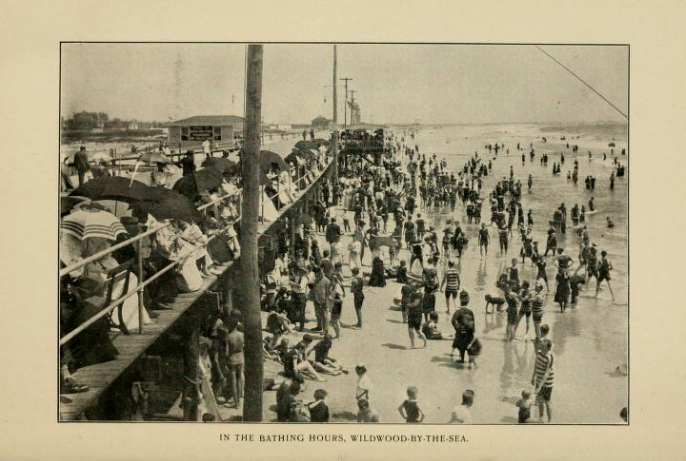Thomas Martindale on Wildwood
Thomas Martindale, the founder of what is now known as the 1st U.S. health food store, was a prolific author, merchant, and hunter. He loved nature. Thomas Martindale writes of the Wildwood area in the year 1905.
Here’s What He Wrote:
Few regions offer more striking contrasts than the sun-bathed coast of Southern New Jersey and the sombre solitudes of the Maine wilderness — the one populous, gay and idyllic; the other remote, solitary and majestic.
In both, I have found many and varied charms and long periods of healthful rest. I make no excuse, therefore, for weaving them together in a garland of the cedar and the pine.
To the casual visitor or the habitual cottager in these parts who has never braved the danger of coming in contact with the poison ivy in a walk through the yet remaining wild jungles between North Wildwood and Anglesea, he cannot have the remotest idea of the wanton growth of plant and floral life in this small stretch of land. No wonder that in years gone by this was the sanctuary of the migratory wild duck, the resting place of the Canada goose, the solitary woodcock, the white egret and the long-legged crane.
Even now I have flushed woodcock, and English snipe from almost under my feet, and many’s the “cotton tail” that has gone bounding from his “form” at my approach. But alack-a-day, the ruthless axe is even now cutting great gases in the “plebian underwood,” and horses are wearily hauling loads of sand to fill up the pools of fresh water, so that streets and sewers and sidewalks may be laid, houses built and electric light wires run on poles to furnish power or artificial light, and soon – all too soon – the flora and fauna upon this bit of nature’s paradise will be submerged and wiped out from the face of the earth.
The grand old trees, the cedars that have stood and braved the winter’s storms for centuries, the oaks, gnarled and weather beaten; the wild cherry trees, the magnolias and hollys, will gladden the eye and afford shelter for wild game no longer.
With Bryant we may soon sing:
“Where are the flowers, the fair young flowers, that lately sprang and stood
In brighter and softer airs, a beauteous sisterhood?
Alas they are all in their graves; the gentle race of flowers
Are lying in their lowly beds, with the fair and good of ours.
The rain is falling where they lie, but the cold November rain
Calls not from out the gloomy earth the lovely ones again.”
Here, indeed, was a rural, sheltered, unobserved retreat, where “nature’s rude magnificence” was riotously displayed, here the song birds nested and hatched out their young, here the muskrat and rabbit found food and shelter for their various wants and appetites, and here the gentle botanist found a rich field for observation and study, and likewise for all those who love to “go forth under the open sky and list to nature’s teachings.”
Excerpt by Thomas Martindale, Pub 1905, from Wildwood Ways and Down-East Wilds

